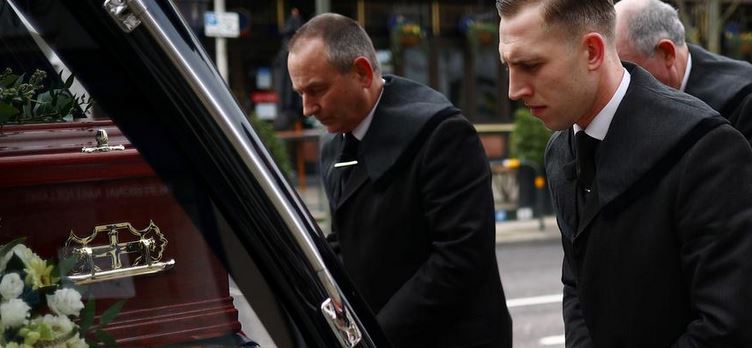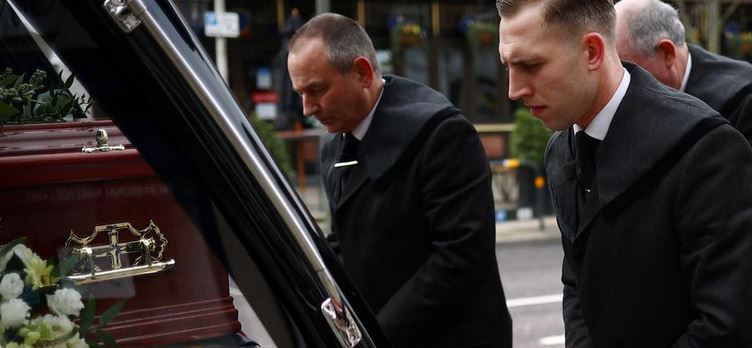 By
Reuters
By
Reuters
It was a normal busy winter for British funeral director Matthew Uden until the second week of
January. “Then it was like someone flicked a switch,” he said.As Britain’s COVID-19 death toll surged into six figures, the phones at W. Uden & Sons, his family’s business in south London, started ringing almost non-stop.
Uden & Sons usually arranges about 10 funerals a day during the winter. Now it is doing 15 or 16, with dozens more bodies awaiting collection from hospitals and care homes.
With the deceased arriving faster than they can be cremated or buried, the company’s own mortuaries are packed with coffins, many pinned with a sign: “COVID-19 - TAKE PRECAUTIONS.”
Britain has recorded more COVID-19 deaths per capita than any other country, but Matthew Uden said he refused to be numbed by the escalating toll.
“These are people’s loved ones, they’re not numbers,” he said. “No matter how busy we are, everyone is treated with the same dignity and respect.”
Staff at funeral homes play vital roles in the battle against the pandemic, but often get less recognition than doctors, nurses and other frontline workers.
Britain’s funeral directors arranged around 90,000 more funerals in 2020 than in recent years, according to the National Association of Funeral Directors, a leading trade association.
“In terms of 2021 (funerals), we’re currently about 30 percent up on a normal January/February,” said Deborah Smith, the association’s spokeswoman.
Reuters spent a day at Uden & Sons, where staff provided a rare window into love, death and grieving in the time of coronavirus, even as they worked long hours to keep up with the march of the dead.
The company was founded in Victorian times, when London endured regular epidemics of smallpox and cholera. Today, it has seven branches in the capital and the neighbouring county of Kent, where a deadlier and more transmissible variant of coronavirus emerged late last year.
On the Thursday when Reuters visited, the company’s bearers carefully loaded coffins onto hearses parked outside its various branches.
On the same day, at the back of the shops, 19 bodies arrived from hospitals and care homes, and another three were collected overnight.
During the pandemic’s first wave last spring, Uden said it took a week and a half to arrange a funeral. Now, families had to wait four or five weeks, as mortuary and registry staff struggled to process the sheer volume of deaths.
The company already has 130 funerals booked for February, among them an unusual number of “double funerals,” of husbands and wives who die around the same time.
Before the pandemic, they arranged about nine such funerals in a year. Now, they have nine in the next month alone. “I’ve never seen anything like it,” said Uden.
One couple had been married for over 50 years and died of COVID-19 within an hour of each other, he said.
SAYING GOODBYE
None of Uden’s staff have caught the virus, which he credits to extra precautions the company has taken. All vehicles are sanitised between funerals, and the limousines have screens to separate driver and passengers.
In the mortuary, embalmer Mary Evans wears heavy duty personal protective equipment as she prepares the body of elderly COVID victim, and doesn’t move the body more than necessary in case the lungs expel infected air droplets.
“When we see a deceased who has died from COVID and been very severely ill, it isn’t very nice,” said Evans. She said her work allowed families to “see their loved ones at rest, looking as peaceful as they can.”
Funeral workers are accustomed to death, but the pandemic had still taken an emotional toll, said Matthew Uden.
His eyes teared up when he recalled a “remarkable” 12-year-old girl who, despite losing her father to COVID, brimmed with strength and positivity at his funeral.
Uden also saw other signs of hope and resilience, despite households being isolated due to lockdown. He said whole neighbourhoods often emerged from their houses to stand silently in respect as a hearse carried someone away.
“It’s so touching to see,” he said. “Even though we’re not together, it’s bringing a real togetherness.”

Pallbearers from W. Uden and Sons Family (PHOTO: Reuters)

No comments:
Post a Comment